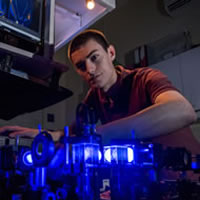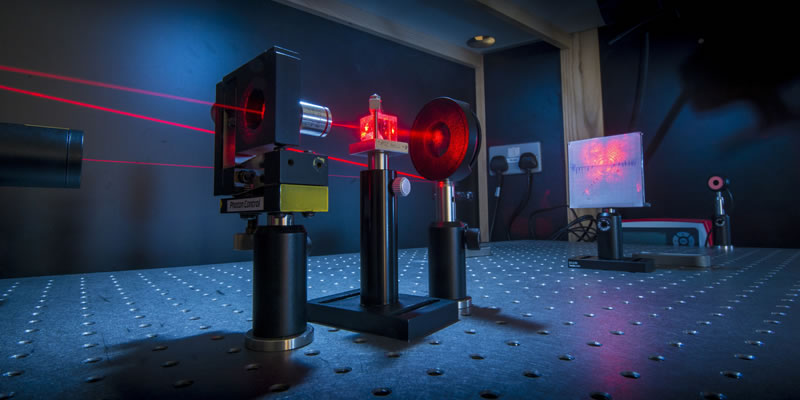For the first three years you’ll follow the MPhys Physics, MPhys Physics with Photonics or MPhys Physics with Nanotechnology degree programme (depending on which degree you applied to study). Alongside your core physics studies you’ll choose from a suite of optional modules, including advanced mathematics, photonics and nanoscience modules that will equip you for your year in research. Through your module selection you can create a pathway towards the research area that most interests you.
The Quantum, Light and Matter group will propose a range of topics to choose from for your fourth-year project, but if you’re interested in doing something that’s not on the list we’ll support you to do it.
Past projects have involved:
- working with lasers on squeezed light quantum experiments
- nanoparticle manipulation using optical tweezers
- looking at the localisation of light in photonic crystals
- hologram optimisation for polariton condensation for quantum computing
- examining the properties of filled carbon nanotubes using Raman scattering
You’ll work under the supervision of an academic who is an expert in the field, conducting novel research that you will write up, present and be tested on in an oral exam. You could even achieve your first publication in a scientific journal.
View the 2019/20 programme specification document for this course
View the 2020/21 programme specification document for this course
Research-grade facilities
You’ll use state-of-the-art equipment in our teaching laboratories, with guidance from expert technicians who are there to support your experimental work. During your year in research you’ll have access to specialist facilities, such as:
- the Nanomaterials Rapid Prototyping Facility, for building and testing novel nanodevices
- a photonics lab with the latest laser equipment
- a £120m Cleanroom Complex for fabrication at the atomic level
- one of the world’s most powerful supercomputers
A top-five research department
Gain your physics degree from one of the top five Russell Group departments for physics and astronomy research (REF 2014). Our research reputation is built on a track record of discovery and we remain on the frontline of new developments. For example, Southampton physicists were instrumental in the development of erbium-doped amplifiers, which are essential to today’s global internet. More recently our scientists were involved in detecting gravitational waves and light from the collision of two neutron stars for the first time.
Our modules are taught by academics who are active researchers, and during your year in the lab you’ll work directly with materials physics experts from our Quantum, Light and Matter research group. We regularly update our modules based on new findings, and you’ll hear about the latest discoveries as they happen – often before they are published and reported in the media.
Accreditation
Our MPhys Physics programmes are accredited by the Institute of Physics
Programme Structure
Through theoretical and lab-based work, year one will introduce you to fundamental areas of physics such as special relativity, quantum physics and electromagnetism. You’ll gain more in-depth knowledge as you progress through the degree, applying your learning in more advanced areas including particle physics and atomic physics.
If you’re among our top-performing students you’ll have the opportunity to move onto the MPhys Physics with a Year of Experimental Research degree in year two. You can then choose from a suite of specialist modules in mathematics, photonics or nanoscience, which will equip you for your year in research.
You’ll join the Quantum, Light and Matter research group from September to May in year four, after which you’ll complete your final report and presentation, and prepare for an oral exam.
Our programmes are highly flexible, enabling you to follow your physics interests. You could also broaden your education by learning a language or choosing from a range of innovative cross-disciplinary modules, on topics including law, business and bioengineering.
To Apply
All undergraduate applications for Physics and Astronomy should be made online through the Universities and Colleges Admissions Service (UCAS).
Students interested in this degree should apply to F303 MPhys Physics, F390 MPhys Physics with Nanotechnology or F369 MPhys Physics with Photonics.
Find out how to apply and get further details about UCAS' website, phone and contact details.
Key Facts
100 per cent of our Physics and Astronomy research has been rated world leading or internationally excellent for its impact on society (REF 2014)
Our top performing students can apply to join the Physics with Experimental Research degree at the end of second year
You'll spend your fourth year working alongside professional researchers in our Quantum, Light and Matter research group. It's a fantastic opportunity to develop research skills and prepare for a PhD.


